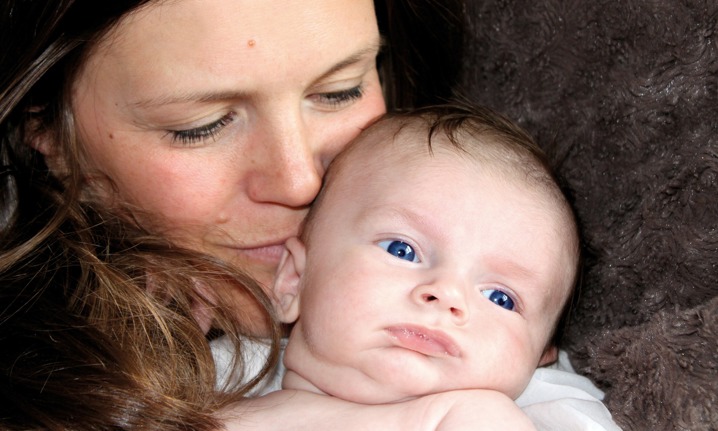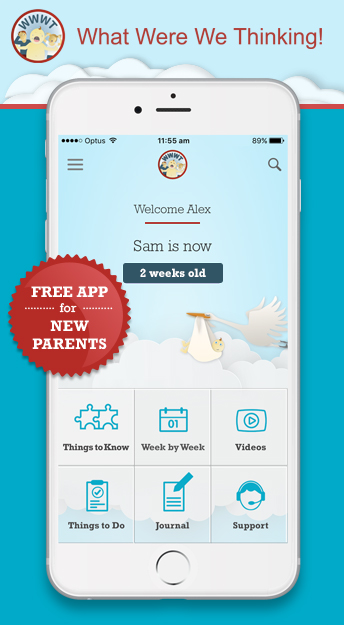When parenting your newborn doesn't exactly go to 'plan'
By Danielle

“Brace yourself!” is the advice I have to offer from this most incredible parenting journey so far. I’ve been blessed to have little Oliver in my life for the last five months and if you’re like me, a type A personality, one thing I’ve learnt to embrace is that there isn’t always a simple solution for everything or a particular roadmap you can follow.
I am a business analyst and have worked on projects for most of my working career so, when I fell pregnant, the following nine months were absolutely ample time to ‘prepare’ for what was ahead. I’ve been an active aunty to seven nieces and nephews however I still dragged my reluctant husband along to all the classes designed for new parents, carefully selected a book specific to the implementation of baby routines and was self-assured and ready for motherhood … or so I thought.
I couldn’t have been more wrong in my assumptions! The sudden sleep deprived haze I found myself in was an immediate shock. With the recovery pain of an emergency C-section (which marked the first of a chain of many unplanned events), together with some seriously tattered nipples and a heart full of a love incomparable to any other I had ever felt, I suddenly found myself feeling completely lost.
The classes that I’d been to did not cater for the fact that Oliver would feed and shred my nipples until they were painful open wounds in the first three days of his life. And the books I’d read didn’t offer any advice into babies that would only sleep if nestled in your arms, waking nearly every hour – around the clock – inconsolable by any other means than milk. Any settling techniques that involved allowing a baby to ‘cry out’ were simply out of the question for me, I was too sleep deprived to deal with the added guilt stirred up by my baby’s tears.
I looked at my little bubba in absolute awe and wondered how it could be possible that this little life my husband and I created, and brought into this world, was able to send me completely off track and away from the safety of my planned and ordered ways – even before I had left the hospital.
Still, I would not let my plans be defeated. I recorded every little instance that happened for nine whole weeks! So the routine in the book didn’t work? “That’s okay,” I thought, jumping into ‘solution mode.’ Taking the data I had collected, I would use my analytical skills to find our baby’s own pattern and we would invent our own daily plan, one that worked for us. What I discovered at a quick glance was that no two days were the same with so much changing from week to week.
In the ninth week I finally had to say goodbye to the routines book – quite literally. I put my cup of tea down on an uneven surface and consequently, the book got drowned. I cried as I mopped up the spilt tea but afterwards saw this as an omen. I should finally let go of all my preconceived ideas of smooth operating routines. It just wasn’t for us.
What a relief it was. All that pressure had lifted and I could enjoy each and every moment without comparing what was happening to what I thought should be happening. Oliver and I were both much more relaxed and happier for it.
I have to admit, I still really love the idea of getting babies into a routine but what I think I’ve learned, from both my own experience and that of other mothers I’ve talked to, is that some babies naturally adapt to a routine from the beginning while others don’t. Some babies fall into a routine months later and if you’ve got a little Oliver like me, it’s best just to surrender to the randomness of parenthood and not be so hard on yourself. Remembering to laugh, even when things aren’t going as well as you had imagined, and remembering that there is help and support out there (such as this wonderful resource), would be my advice to new parents.
Enjoy the abundance of love that comes with each and every unplanned moment …
Expert response from What Were We Thinking! expert, Ann O'Doherty
Thanks for your blog post Danielle, I love the wording you use, “brace yourself”, for those starting their parenting journey. It encompasses the amazing rollercoaster of emotional and physical highs and lows that come with being a new parent.
I read with interest your description of using your well honed organisational and planning skills to approach parenting. I think we all try to fall back on the strengths we know we have in order to try and make sense of this new chapter in our lives.
Nothing can really prepare us for the overwhelming experience that being a new parent is. When we have had organised lives and responsible jobs, the unpredictability of a newborn baby can be difficult to adjust to – especially when we are recovering from birth and dealing with breastfeeding issues like yourself (there is nothing as exquisitely painful as a damaged nipple!)
In regard to developing routines, every baby and family are so different and as you have found, there is no book or app that fits every baby and situation. What can be helpful, however, are some guidelines to give a little help while still being flexible enough to adapt to different baby’s needs.
All babies cry and are unsettled at times (this is how they communicate with us), but some are prone to much more crying than others, especially in the late afternoon and evening, and this distress can last for many hours. Sometimes, no matter what you do – the rocking, patting, stroking, feeding, singing and cuddling – nothing can seem to make any difference and the persistent crying is very hard to deal with. This can in turn make us doubt our parenting skills. The amount of crying has nothing to do with any parent skills but can be due to various factors including the temperament of the baby. Babies are born with a particular temperament which influences how they respond to their bodies and the world around them.
The distress and crying that babies display is often called colic. Colic tends to peak at about 6 weeks before gradually settling down as babies get older. We don’t really know that much about colic but getting a GP check (to rule out any medical issues) if you feel that your baby’s crying is excessive and seeing your Maternal and Child Health Nurse for some strategies and ideas can be a good place to start. The WWWT! also offers advice for new parents on getting the help and support they need.
The WWWT! program suggests an approach called Feed Play Sleep that can be adapted to most babies from birth. Feed when they wake or indicate hunger, play after feeds (during the day) if baby is in a responsive state and back to sleep once tired signs are displayed. Every time you respond to your baby’s needs with a caring cuddle, feed, sleep or playtime opportunity you are helping her understand her world is a safe and predictable place.
The Feed Play Sleep approach also informs parents about how quickly young babies become tired and can help parents recognize tired signs and reduce the development of over tiredness. When we following our baby’s rhythms around feeding and sleep needs, we can reduce the chances of over tiredness/overstimulation which can lead to difficulty settling and increased distress.
As Oliver gets to be a toddler and pre-schooler, routines around daily activities, play time, family interactions and rituals are a comforting and affirming practice for children. These build a sense of belonging, strengthen family relationships and help children feel safe and secure.
As you have found though there is no perfect system and recognizing, as you have, what works best for you and Oliver sounds like it has made your parenting journey more relaxed and enjoyable. I hope you are caring for yourself and getting reasonable amounts of sleep (as much as you can!) while you enjoy your journey with your amazing baby.
Posted in: A new reality Baby 0-4 weeks Every baby is different Mums Your needs








